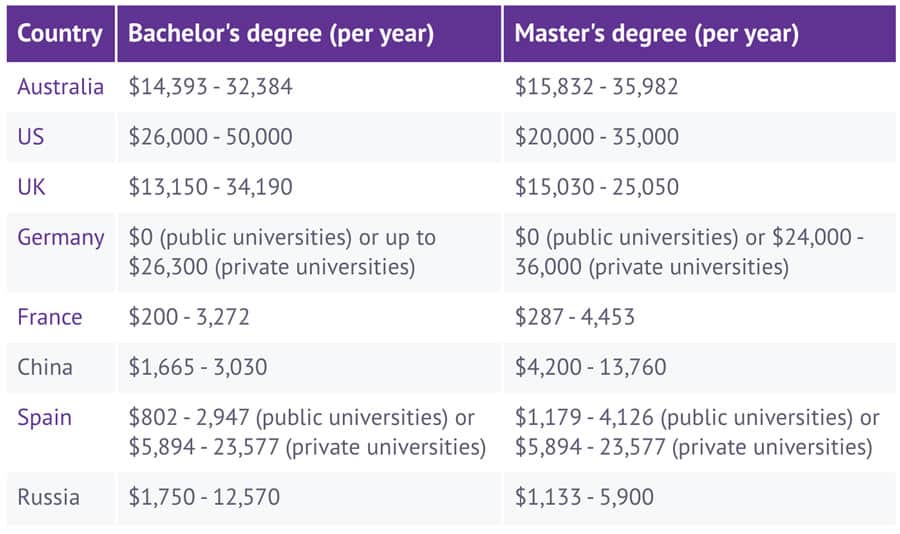Studying abroad can be a life-changing experience, but before diving in, it’s crucial to understand the true cost associated with such an opportunity. Many students assume that tuition alone will dictate their finances, but the reality is far more complex. Anticipating expenses can save you from financial stress:
- Tuition Fees: These can vary greatly depending on the institution and location.
- Accommodation: Another significant expense, which may escalate in urban centers.
- Travel Costs: Don’t forget that airfare and local transportation can add up quickly.
- Cost of Living: From groceries to entertainment, everyday expenses can be surprising.
Understanding these elements helps students prepare both their finances and mindset, ensuring they can enjoy their time abroad to the fullest.
Common Misconceptions
There are several misconceptions surrounding the cost of studying abroad that can lead to unexpected hurdles:
- “I only need to worry about tuition.” This is a major oversight; accommodation and living expenses are often just as significant.
- “Studying abroad is prohibitively expensive.” While costs can be high, many affordable options are available, especially in countries with low tuition fees.
- “Financial aid isn’t an option.” Many students successfully utilize scholarships, grants, and loans to offset costs.
By addressing these misconceptions, students can better navigate the planning process and make informed decisions about their study abroad journey.

Pre-Departure Expenses
Application Fees and Tests
Before setting off on a journey abroad, students often overlook some fundamental expenses that crop up during the application process. Understanding these pre-departure costs is crucial to avoid unexpected financial strain.
- Application Fees: Many universities charge an application fee, which can range from $50 to $200. This fee is typically non-refundable, so it’s essential to factor it into your budget from the beginning.
- Standardized Tests: If your program requires standardized tests like the TOEFL or GRE, consider the costs associated with these as well. Registration fees alone can be around $150 to $300, and there might be additional costs for study materials or prep courses.
Pro Tip: To ease your financial burden, request fee waivers from colleges or utilize scholarships for test preparation.
Visa and Healthcare Costs
Obtaining a student visa is a critical step that comes with its own set of expenses. Most countries require a visa application fee, ranging from $50 to $1,000, depending on the destination.
- Visa Application: This fee, while sometimes included in program costs, often requires out-of-pocket payment. Ensure you understand your program’s stipulations and apply as early as possible to avoid rush fees.
- Healthcare Insurance: It’s vital to secure health insurance for your time abroad. Many programs either include health insurance in their fees or require students to purchase their own. The cost for health insurance can range from $30 to over $100 per month, depending on coverage.
In summary, from application fees to necessary visa and healthcare expenses, being aware of these pre-departure costs allows students to budget effectively and embark on their study abroad adventure without financial surprises.

Tuition and Living Costs
Cost of University Tuition
When considering studying abroad, one of the most significant expenses is university tuition. In the UK, for example, tuition fees for a one-year master’s program average around £17,000. These costs can vary widely depending on the institution, the program of study, and the country itself.
- Costs to consider:
- UK: Approximately £17,000 per year
- Cyprus: Around €9,000
- Hungary: About $7,000 USD
Understanding these figures can be daunting, but they are essential for budgeting. Many universities offer scholarships or grant opportunities, so it’s worth exploring those options to help alleviate financial pressures.
Accommodation and Meals Expenses
In addition to tuition, accommodation and meals are vital components of your overall expenses. The living cost for students in the UK can average around £12,000 annually.
- Accommodation options:
- On-campus housing: Often cheaper and more convenient.
- Off-campus apartments: Can vary greatly in price based on location.
- Meals: Eating out can become quite costly, especially in major cities.
Here are budget-friendly tips to manage these expenses:
- Cook at home: Preparing your meals can significantly reduce food costs.
- Choose local markets: Shopping at local markets often provides fresh produce at lower prices.
Being aware of these costs and planning accordingly will enable students to enjoy their study abroad experience without the constant stress of financial strain. Planning ahead might even leave some room for those fun weekend excursions!

Additional Expenses to Consider
Travel Insurance and Transportation Costs
As you prepare for your study abroad adventure, don’t forget about travel insurance and transportation costs. These elements can deeply impact your budget and overall peace of mind while overseas.
- Travel Insurance: This is your safety net in case of unexpected events—think emergency medical situations, lost luggage, or trip cancellations. Be prepared to spend anywhere from $100 to $500 for comprehensive coverage, depending on the length of your stay and the extent of the protection.
- Transportation Costs: Getting to and from your destination can add up significantly. Airfare is often one of the most substantial expenses, averaging around $1,000 for an open return. Once in your host country, consider costs for public transport, taxis, or even regional flights if you plan to explore new cities.
Pro Tip: Research local transportation options ahead of time. Certain cities offer student discounts or transit passes that can make daily commuting more affordable.
Study Materials and Personal Expenses
Investing in study materials is another important consideration for your budget. Depending on your course requirements, you might need to spend anywhere from $200 to $600 on textbooks and supplies.
- Required Study Materials: Don’t forget to budget for items such as notebooks, software licenses, or lab equipment.
- Personal Expenses: This category can be surprisingly vast—everything from laundry and toiletries to dining out and social activities. Opt to cook at home and indulge in local markets whenever possible to save.
By planning for these additional expenses, students can create a comprehensive financial plan that accommodates both academic requirements and personal enjoyment during their time abroad. Being proactive about budgeting will ensure that your focus can remain on learning and exploring rather than stressing about finances!

Scholarships and Financial Aid Options
Merit-Based Scholarships
For many students, merit-based scholarships are a fantastic way to reduce the financial burden of studying abroad. These scholarships are awarded based on academic achievement, leadership qualities, or specific talents, making them an excellent opportunity for high-achieving students.
- Types of Merit-Based Scholarships:
- Academic Scholarships: These reward students with high GPAs or standardized test scores.
- Athletic Scholarships: Talented athletes can benefit from funding based on sports performance.
- Specialty Scholarships: Some institutions offer scholarships for specific fields of study, such as STEM or the arts.
Applying for merit-based scholarships often requires a personal statement or essays, along with letters of recommendation. Take time to highlight your achievements and demonstrate why you deserve the award.
Need-Based Financial Aid
On the other hand, need-based financial aid is designed for students who may not have the resources to study abroad without financial assistance. This type of aid considers your family’s financial situation and can significantly relieve the monetary strain.
- Types of Need-Based Financial Aid:
- Grants: Unlike loans, these do not have to be repaid. They are usually awarded based on financial need.
- Work-Study Programs: This option allows students to work part-time during their studies to help pay for expenses.
To qualify for need-based aid, students typically fill out financial aid forms, and in some cases, may need to provide documentation of family income. These opportunities make studying abroad more attainable, allowing students to focus on their education and experiences rather than worrying about finances. Make sure to explore all available options to maximize your potential funding!
